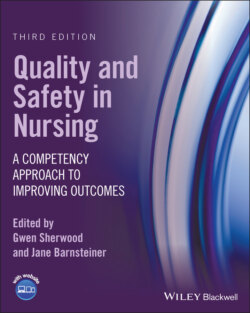Читать книгу Quality and Safety in Nursing - Группа авторов - Страница 92
Textbox 2.4 Nurses’ Engagement in Policy at Every Level of the System
ОглавлениеTo impact institutional policy, every nurse, regardless of setting or specialty, has expertise to contribute to the discussions focused on health care improvement. Nurses can:
Take the opportunity to question practices that lack a base of evidence or seek literature that informs practice questions.
Collect data and utilize National Database of Nursing Quality Indicators to inform and lead better practices that will improve fall assessments or reduce falls, or improve one’s own assessment skills regarding stages of decubiti.
Devise local studies with the assistance of more senior experts and inclusive of patient and family advocates to explore or establish the evidence that either supports or disproves care practices.
Teach colleagues what has been learned and review institutional or specialty policies about ineffective practices employed and innovative new strategies under study.
Engage patient and family advisory groups and representatives to co‐design improvements to their health care system, whether big or small.
Publish findings, experiential learning, and literature reviews to influence policy changes in others.
Engage with others in the institution to review proposed rules and regulations that impact them and offer public comment on professional organizations’ position statements, local or state proposed rules, or Centers for Medicare and Medicaid Services (CMS)‐proposed rules. Proposed rules are published along with the timeline for comment in the Federal Register.
Innovate: necessity is the mother of innovation. Create innovative practices that build from the Quality and Safety Education for Nurses competencies, ensuring that patients and families are at the center of decision‐making and discharge planning.
To impact local or community policies, nurses can:
Assess community needs or practices that perpetuate risks for falls, whether due to poor sidewalks, potholes in grocery parking lots, or cluttered hallways and aisles in stores, schools, or churches.
Seek out those who represent health or racial disparities. Seek first to understand their challenges and engage alongside them to look for solutions.
Advocate for community consensus on policies or regulations to reduce danger to children and elderly pedestrians.
Provide education about reducing falls, improving medication adherence, or increasing patient engagement in making care decisions or choices about end‐of‐life care.
Utilize scientific principles to educate community members and contacts of all ages regarding infection control practices.
Identify and create solutions for addressing mental and behavioral health concerns by recognizing, supporting, and referring to local programs and services.
Volunteer to serve on local YMCA boards, hospital boards, or other local service organizations that may be able to effect changes in services, provide access to better nutrition, or offer safer alternatives for exercise.
To impact state policy nurses can:
Demand greater clarity and compliance with CMS guidance regarding Medicaid services for children who are not receiving the supplies they need for their chronic illness, or who lack the services to keep them safe in schools or after school.
Engage with local or state chapters of professional nursing associations to coordinate advocacy for change, for modifications to practice acts, or for improved services for at‐risk populations.
Actively participate in your state nurses association lobby day, including scheduling and speaking to the legislators representing your own districts.
Actively engage in political campaigns around platforms on health care, agree to serve on state licensing boards, or attend state legislative hearings and meetings.
Develop talking points regarding policy solutions and seek platforms to communicate these to policy‐makers and stakeholder groups.
Utilize blogs, podcasts, and other tools to provide accurate factual information on health needs, causes, and disparities.
Utilize media approaches to alert consumers and professionals to proposed policy.
To impact national policy nurses must:
First keep themselves and their colleagues informed of the issues and proposed legislation.
Develop skills and expertise at representing their specialty, letting those in the specialty organization know of topical expertise.
Engage in leadership roles within their preferred professional national nursing association.
Actively participate on Expert Panels and Committees of the American Academy of Nursing and the American Nurses Association (ANA).
Attend the national Hill day sponsored by ANA or another professional association.
Take action to contact members of Congress or senators regarding passage of bills that affect their state and community.
Share stories with their representatives that highlight the need for changes in health care.
Work with their institutions to invite a member of Congress or senator to walk a day in the shoes of a nurse, in order to better understand the challenges of short staffing, limited resources, or other needs of the community.
